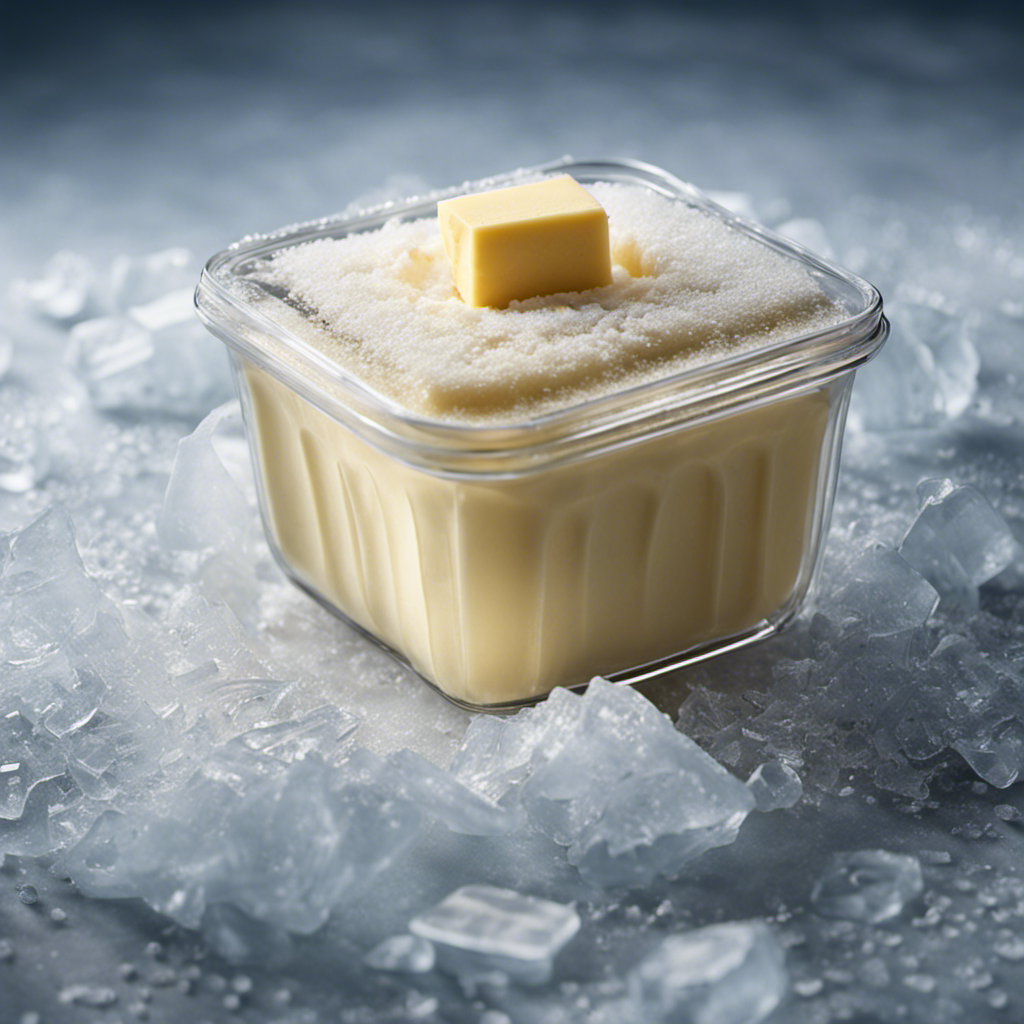Have you ever thought about how long it’s safe to eat butter after it expires? In this article, I will explore the factors that influence the shelf life of butter and offer suggestions on how to prolong the usage of expired butter.
We’ll also explore the signs of spoiled butter and discuss safe consumption practices. By following proper storage practices, you can ensure that your butter stays fresh for longer.
So, let’s dive in and uncover the truth about expired butter.
Key Takeaways
- Butter can still be good for up to a week after it expires, as the expiration date on the packaging is just a guideline.
- Factors like storage conditions and handling can affect butter’s longevity, so it is important to store butter in a cool, dark place away from direct sunlight and strong odors.
- Temperature is the most important factor affecting butter’s shelf life, with an ideal temperature of around 40°F (4°C). Keep butter tightly wrapped or stored in an airtight container to minimize exposure to air and prevent it from going rancid or spoiling prematurely.
- Signs of spoiled butter include changes in smell, color, or texture, such as a strong, unpleasant odor, yellow or brownish color, and greasy or slimy texture. It is crucial to discard any butter that shows signs of spoilage to avoid health risks.
Understanding Butter Expiration Dates
Butter can still be good for up to a week after it expires. Understanding butter quality and proper butter preservation techniques can help determine its shelf life.
When it comes to butter, freshness is crucial for optimal taste and texture. The expiration date on the packaging indicates the manufacturer’s estimate of how long the butter will remain at its best quality. However, it is important to note that this date is just a guideline.
Factors such as storage conditions and handling can affect butter’s longevity. To extend its shelf life, store butter in a cool, dark place, away from direct sunlight and strong odors. Additionally, using clean utensils and sealing the butter properly after each use can help prevent unwanted contamination and maintain its freshness longer.
Factors Affecting Butter Shelf Life
To maximize the shelf life of your butter, pay attention to certain factors like storage conditions and exposure to air. Butter is a dairy product that can spoil if not stored properly. The storage conditions play a crucial role in determining how long your butter will last. The most important factor is temperature. Butter should be stored in a cool, dry place away from direct sunlight, as exposure to heat can cause it to go rancid. Ideally, the temperature should be around 40°F (4°C) to keep the butter fresh for longer.
Additionally, it is important to keep the butter tightly wrapped or stored in an airtight container to minimize exposure to air, which can lead to oxidation and spoilage. By taking these storage conditions into consideration, you can extend the shelf life of your butter and prevent it from going bad prematurely.
Now let’s discuss the signs of spoiled butter.
Signs of Spoiled Butter
Make sure you check for any changes in smell, color, or texture, as these can indicate that your butter has spoiled. Signs of rancid butter include a strong, unpleasant odor, a yellow or brownish color, and a greasy or slimy texture.
Consuming spoiled butter can pose health risks, as it can contain harmful bacteria and toxins. Rancid butter can cause food poisoning symptoms such as nausea, vomiting, and diarrhea. It is important to discard any butter that shows signs of spoilage to avoid these health risks.
In the next section, we will explore ways to extend the lifespan of expired butter to minimize waste.
Extending the Lifespan of Expired Butter
When it comes to consuming butter, it’s important to know the safe methods of consumption to avoid any health risks.
Additionally, proper storage of butter is crucial in order to maintain its freshness and prevent it from spoiling prematurely.
In this discussion, I will explore the safe consumption methods for butter and provide you with some storage tips to help extend its lifespan.
Safe Consumption Methods
You can still consume butter safely even after it has expired by using it in cooked dishes or by clarifying it. Here are some safe consumption guidelines to keep in mind:
-
Cooking: When butter is heated to a high temperature, any potential bacteria or mold present in expired butter will be killed. So, using expired butter in recipes that require cooking, such as sautéing vegetables or baking, is a safe option.
-
Clarifying: Clarifying butter involves melting it and separating the milk solids. This process removes any potential contaminants, making the clarified butter safe to consume even if it has expired.
-
Sensory evaluation: Before using expired butter, trust your senses. Check for any off smells, unusual textures, or signs of mold. If the butter looks and smells fine, it is likely safe to use.
While consuming expired butter may come with potential health risks, following these safe consumption methods can minimize the chances of any adverse effects.
Storage Tips for Butter
Storing butter in an airtight container in the refrigerator helps to maintain its freshness and prevent it from spoiling quickly. Proper storage is essential to extend the shelf life of butter and ensure its quality.
When it comes to butter storage containers, choosing an airtight container is crucial to protect the butter from absorbing any odors or flavors from other foods in the refrigerator. Additionally, keeping butter at the right temperature is equally important. The ideal storage temperature for butter is between 32°F and 41°F (0°C and 5°C). This low temperature helps to slow down the growth of bacteria and maintain the butter’s texture and flavor for a longer period.
By following these storage tips, you can enjoy fresh and delicious butter for an extended time.
To ensure the safe consumption of expired butter, it is important to understand the signs of spoilage and the potential risks involved.
Safe Consumption of Expired Butter
To determine if expired butter is safe to consume, check for any signs of spoilage like off smells or unusual colors. If the butter smells rancid or has developed a strong, unpleasant odor, it is best to discard it. Similarly, if the butter has changed in color, appearing yellowish or brownish, it is likely spoiled and should not be consumed. Additionally, if there is any mold growth on the surface of the butter, it is a clear indication of spoilage and should be thrown away.
While some people may choose to consume expired butter, it is important to prioritize safe handling and consider healthier alternatives such as margarine or ghee.
Transitioning into the subsequent section about proper storage practices, it is crucial to store butter in a cool, dry place to maintain its freshness and quality.
Proper Storage Practices for Butter
When properly stored, butter can maintain its freshness and quality for an extended period of time. One of the key factors in ensuring proper storage of butter is the choice of storage containers. It is recommended to use airtight containers that can protect the butter from exposure to air and moisture. This helps in preventing the butter from becoming rancid or developing off flavors.
Additionally, the ideal temperature for butter storage is between 32°F and 41°F (0°C and 5°C). Storing butter at this temperature range slows down the process of oxidation and keeps it in a solid state. It is important to avoid storing butter in the refrigerator door or near other pungent foods, as it can absorb their odors.
Frequently Asked Questions
Can I Still Use Butter That Has Expired?
Expired butter can still be used for alternative purposes, such as greasing pans or adding flavor to dishes. However, it may have a negative impact on recipes and baked goods, affecting their taste and texture.
How Long Can Butter Be Safely Consumed After the Expiration Date?
After the expiration date, butter can still be safely consumed for around 1-2 weeks if stored properly in the refrigerator. It’s important to check for any signs of spoilage. As for expired butter, it can be used creatively in cooking for added flavor and richness.
What Are the Signs That Butter Has Gone Bad?
Signs of rancid butter include a sour or unpleasant smell, a yellow or brown appearance, and a bitter or off taste. To tell if butter is spoiled, trust your senses and discard if unsure.
How Can I Extend the Lifespan of Expired Butter?
How can I extend the lifespan of expired butter? Are there ways to repurpose it? And how can I tell if expired butter is safe to eat? Let’s explore these questions and find evidence-based answers.
What Are the Proper Storage Practices for Butter to Prevent Spoilage?
Storing butter properly can prevent spoilage and extend its lifespan. To keep it fresh, store it in the refrigerator, away from strong odors, and in an airtight container. Check for any signs of spoilage before using.
Conclusion
In conclusion, when it comes to expired butter, trust your instincts and use your senses. Just like a detective cracking a case, look for clues of spoilage and rely on your taste buds to guide you.
While it’s always best to consume butter within its expiration date, a little flexibility can be allowed. But remember, treat expired butter like a tightrope walker – proceed with caution.
Follow proper storage practices and extend its lifespan if possible, but don’t take unnecessary risks with your health.










